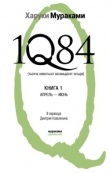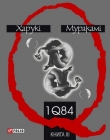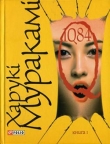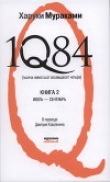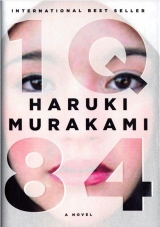
Текст книги "1q84"
Автор книги: Haruki Murakami
Жанр:
Современная проза
сообщить о нарушении
Текущая страница: 45 (всего у книги 81 страниц)
Then she went through the non-food items: toilet paper, tissues, laundry detergent, rubber gloves. Nothing was missing. The shopping had been done with great care. A woman must have participated in the preparations—probably an experienced housewife, judging from the obvious care that had been lavished on the task. Someone had meticulously calculated what and how much would be needed for a healthy thirty-year-old single woman to live here alone for a short time. This was not something a man could have done—though perhaps it would be possible for a highly observant gay man.
The bedroom linen closet was well stocked with sheets, blankets, and spare pillows, all with the smell of new linen, and all plain white. Ornamentation had been carefully avoided, there being no need for taste or individuality.
The living room had a television, a VCR, and a small stereo with a record player and a cassette deck. On the wall opposite the window, there was a waist-high wooden sideboard. She bent over and opened it to find some twenty books lined up inside. Someone had done their best to assure that Aomame would not be bored while hiding out here. The books were all new hardcover volumes that showed no evidence of having been opened. Most of them were recent, probably chosen from displays of current bestsellers at a large bookstore. The person had exercised some standards of selection—if not exactly taste—in choosing about half fiction and half nonfiction. Air Chrysalis was among them.
With a little nod, Aomame picked it up and sat on the living-room sofa in the warm sunshine. It was not a thick book. It was light, and the type was large. She looked at the dust jacket and at the name of the author, “Fuka-Eri,” printed there, balanced the book on her palm to gauge its weight, and read the publisher’s copy on the colorful band around the jacket. Then she sniffed the book for that special smell that new books have. Though his name was nowhere printed on it, Tengo’s presence was here. The text printed inside it had passed through Tengo’s body. She calmed herself and opened to the first page.
Her teacup and the Heckler & Koch were both where she could reach them.
CHAPTER 18
Tengo
THAT LONELY, TACITURN SATELLITE
“She might be very close by,” Fuka-Eri said after some moments of biting her lip in serious thought.
Tengo unfolded and refolded his hands on the table, looking into Fuka-Eri’s eyes. “Very close by? You mean here, in Koenji?”
“Within walking distance.”
How do you know that? Tengo wanted to ask her, but he was at least prescient enough to know that he would not get an answer to such a question. She needed practical questions that could be answered with a simple yes or no.
“Are you saying that I can meet Aomame if I look for her in this neighborhood?” Tengo asked.
Fuka-Eri shook her head. “You can’t meet her just by walking around.”
“She’s within walking distance, but I can’t find her just by walking around. Is that what you are saying?”
“Because she’s hiding.”
“Hiding?”
“Like a wounded cat.”
Tengo got an image of Aomame curled up under a moldy-smelling porch somewhere. “Why? Is she hiding from someone?” he asked.
This, of course, she did not answer.
“But the fact that she is hiding must mean that she is in some kind of critical situation, doesn’t it?”
“Crit-i-cal sit-choo-ay-shun,” Fuka-Eri said, echoing Tengo, with a look on her face like that of a child being shown a bitter medicine. She probably didn’t like the sound of the words.
“Like, someone is chasing after her,” Tengo said.
Fuka-Eri cocked her head slightly, meaning she didn’t understand. “But she is not going to stay here forever.”
“Our time is limited.”
“Yes, limited.”
“But now she is sitting somewhere like a wounded cat, so she won’t be out taking walks.”
“No, she won’t do that,” the beautiful young girl said with conviction.
“In other words, I’d have to look for her someplace special.”
Fuka-Eri nodded.
“What kind of special place would that be?” Tengo asked.
Needless to say, he received no answer.
“You remember some things about her,” Fuka-Eri said after a short pause. “One of them might help.”
“Might help,” Tengo said. “Are you saying that if I remember something about her, I might get a hint about where she is hiding?”
Without answering, she gave a little shrug. The gesture might have contained an affirmative nuance.
“Thank you,” Tengo said.
Fuka-Eri gave him a tiny nod, like a contented cat.
Tengo prepared lunch in the kitchen. Fuka-Eri was intently choosing records from the record shelf. Not that he had a lot of records there, but it took her time to choose. At the end of her deliberations, she took out an old Rolling Stones album, put it on the turntable, and lowered the tonearm. It was a record that he had borrowed from somebody in high school and, for some reason, never given back. He hadn’t heard it in years.
Listening to tracks like “Mother’s Little Helper” and “Lady Jane,” he made rice pilaf using ham and mushrooms and brown rice, and miso soup with tofu and wakame. He boiled cauliflower and flavored it with curry sauce he had prepared. He made a green bean and onion salad. Cooking was not a chore for Tengo. He always used it as a time to think—about everyday problems, about math problems, about his writing, or about metaphysical propositions. He could think in a more orderly fashion while standing in the kitchen and moving his hands than while doing nothing. Today, however, no amount of thinking would tell him what kind of “special place” Fuka-Eri had been talking about. Trying to impose order on something where there had never been any was a waste of effort. The number of places he could arrive at was limited.
The two of them sat across from each other eating dinner. Their conversation was virtually nonexistent. Like a bored married couple, they transported the food to their mouths in silence, each thinking—or not thinking—separate thoughts. It was especially difficult to distinguish between the two in Fuka-Eri’s case. When the meal ended, Tengo drank coffee and Fuka-Eri ate a pudding she found in the refrigerator. Whatever she ate, her expression never changed. Chewing seemed to be the only thing she was thinking about.
Tengo sat at his desk, and, following Fuka-Eri’s suggestion, he tried hard to recall something about Aomame.
You remember some things about her. One of them might help.
But Tengo could not concentrate. Another Rolling Stones record was playing. “Little Red Rooster”—a performance from the time Mick Jagger was crazy about Chicago blues. Not bad, but not a song written for people engaged in deep thinking or in the midst of seriously digging through old memories. The Rolling Stones were not a band much given to such kindness. He needed someplace quiet where he could be alone.
“I’m going out for a while,” Tengo said.
Studying the Rolling Stones album jacket in her hand, Fuka-Eri nodded, as if to say, “Fine.”
“If anyone comes here, don’t open the door for them,” Tengo said.
Tengo walked toward the station wearing a navy-blue long-sleeved T-shirt, chinos from which the crease had long since faded, and sneakers. Just before reaching the station, he turned into a bar called Barleyhead and ordered a draft beer. The place served drinks and snacks. It was small enough so that twenty customers filled it up. He had come here any number of times before. Young people made it quite noisy late at night, but there were relatively few customers in the hour between seven and eight, when the mood was nice and hushed. It was perfect for sitting alone in a corner and reading a book while drinking a beer. The chairs were comfortable, too. He had no idea where the bar’s name came from or what it meant. He could have asked one of the employees, but he was not good at small talk with strangers, and not knowing the source of the name didn’t really matter. It was just a pleasant bar that happened to be named Barleyhead.
Fortunately, no music was playing. Tengo sat at a table by a window, drinking Carlsberg draft and munching on mixed nuts from a small bowl, thinking about Aomame. Picturing Aomame meant that Tengo himself became a ten-year-old boy again. It also meant that he experienced a major turning point in his life once again. After Aomame grasped his hand when they were ten, he refused to make any more rounds with his father doing NHK subscription collections. Shortly after that he experienced a definite erection and his first ejaculation. That was a watershed in his life. Of course, the transformation would have come—sooner or later—whether or not Aomame grasped his hand, but Aomame urged him on and promoted the change as if she had given his back a gentle shove.
He stared at the open palm of his left hand for a long time. That ten-year-old girl grasped this hand and hugely changed something inside me, but I can’t give a reasonable explanation of how such a thing could have happened. Still, the two of us understood each other and accepted each other in a very natural way in every last particular—almost miraculously so. Such things don’t happen all that often in this life. For some people, they might never happen. At the time, however, Tengo had not been able to fully comprehend the event’s decisive meaning. And not just back then. He had not truly been able to understand its meaning until almost the present moment. He had only vaguely embraced the girl’s image in his heart over the years.
She was thirty now, and her outward appearance might be very different from what he remembered from when they were ten. She must have grown taller, her chest developed, and her hairstyle must have changed. If she left the Society of Witnesses, she was probably wearing makeup. She might be sporting expensive, stylish clothing. Tengo found it hard to imagine Aomame striding down the street wearing a Calvin Klein suit and high heels. But such a thing was, of course, conceivable. People grow up, and when they grow up they change. She could be in this bar right this moment without my realizing it.
Tipping back his beer glass, Tengo took another look at his surroundings. She was somewhere close by. Within walking distance. Fuka-Eri said so. And Tengo accepted Fuka-Eri at her word. If she said it, it must be true.
The only other customers in the room were a young couple, probably students, sitting at the bar, engaged in an intense and intimate conversation, their foreheads practically touching. Seeing them, Tengo felt a profound loneliness, the sort he had not experienced for a very long time. I’m alone in this world, he thought. I have no ties with anyone.
Tengo closed his eyes and concentrated on the elementary school classroom once again. He had closed his eyes and visited that place last night, too—with a tremendously concrete sense of reality—when he and Fuka-Eri joined bodies during the violent thunderstorm. Because of that, the picture he conjured now came back with special vividness, as if it had been cleansed of all dust by last night’s rain.
Unease and expectation and fear scattered to the farthest corners of the spacious classroom, and hid themselves in the room’s many objects like cowardly little animals. Tengo was able to re-create the scene in meticulous detail—the blackboard with its partially erased mathematical formulas, the broken pieces of chalk, the cheap, sun-damaged curtains, the flowers in the vase on the teacher’s podium (though he couldn’t tell what type), the children’s paintings pinned to the wall, the world map behind the podium, the smell of the floor wax, the waving of the curtains, the children’s shouts coming through the window. His eyes could trace each omen or plan or riddle they contained.
During those several seconds when Aomame was holding his hand, Tengo had seen many things and accurately seared each image on his retinas, like a camera taking a photograph. These images comprised one of the basic landscapes that helped him survive his pain-filled teens. The scene always included the strong sensation of the girl’s fingers. Her right hand never failed to encourage Tengo during the agonizing process of becoming an adult. Don’t worry, I’m with you, the hand declared.
You are not alone.
She is in hiding, Fuka-Eri had said. Like a wounded cat.
Come to think of it, this was a strange coincidence. Fuka-Eri herself was in hiding here. She wouldn’t set foot outside of Tengo’s apartment. In this same section of Tokyo, two women were lying low, running away from something. Both women had deep connections with Tengo. Could that be significant? Or was it a mere coincidence?
No answers were forthcoming, of course, just an aimless bunch of questions. Too many questions, too few answers. It was always like this.
When he finished his beer, a young waiter came over and asked him if he would like something else. Tengo hesitated a moment and then requested a bourbon on the rocks and another bowl of mixed nuts. “The only bourbon we have is Four Roses, if that’s okay.” Tengo said it would be okay. Anything at all. Then he went back to thinking about Aomame. The fragrance of a baking pizza wafted toward him from the kitchen.
From whom could Aomame possibly be hiding? The police? But Tengo could not believe that she had become a criminal. What kind of crime could she have committed? No, it could not be the police who were chasing her. Whoever or whatever it might be, the law surely had nothing to do with it.
Maybe they’re the same ones who are after Fuka-Eri, it suddenly occurred to Tengo. The Little People? Why would the Little People have to pursue Aomame?
But if they are really the ones pursuing Aomame, am I at the center of this? Tengo of course had no idea why he had to be the pivotal figure in such a chain of events, but if there was a connection between the two women, Fuka-Eri and Aomame, it could not be anyone other than Tengo himself. Without even being aware of it, I may have been using some kind of power to draw Aomame closer to me.
Some kind of power?
He stared at his hands. I don’t get it. Where could I have that kind of power?
His Four Roses on the rocks arrived along with a new bowl of nuts. He took a swallow of Four Roses, and, taking several nuts in the palm of his hand, he shook them like dice.
Anyhow, Aomame is in this neighborhood. Within walking distance. That’s what Fuka-Eri says. And I believe it. I’d be hard-pressed to explain why, but I do believe it. Still, how can I go about finding Aomame in her hiding place? It’s hard enough finding someone living a normal life, but the task obviously becomes morechallenging when someone is deliberately hiding. Should I go through the streets calling her name on a loudspeaker? Sure, like that’s going to get her to step right up. It would just alert others to her presence and expose her to added danger.
There must be something else I should recall about her, Tengo thought.
“You remember some things about her. One of them might help,” Fuka-Eri had said. But even before she said that to him, Tengo had long suspected that he might have failed to recall an important fact or two regarding Aomame. It had begun to make him feel uneasy now and then, like a pebble in his shoe. The feeling was vague but persistent.
Tengo swept his mind clean, as if erasing a blackboard, and started unearthing memories again—memories of Aomame, memories of himself, memories of the things around them, dredging the soft, muddy bottom like a fisherman dragging his net, putting the items in order and mulling them over with great care. Ultimately, though, these were things that had happened twenty years earlier. As vividly as he might recall them, there was a limit to how much he could bring back.
It occurred to him to try thinking about lines of vision. What had Aomame been looking at? And what had Tengo himself been looking at? Let me think back along our moving lines of vision and the flow of time.
The girl was holding his hand and looking straight into his eyes. Her line of vision never wavered. Tengo, initially at a loss to understand her actions, sought an explanation in her eyes. This must be some kind of misunderstanding or mistake, Tengo had thought. But there was no misunderstanding or mistake here. What he realized was that the girl’s eyes were almost shockingly deep and clear. He had never seen eyes of such absolute clarity. They were like two springs, utterly transparent, but too deep to see the bottoms. He felt he might be sucked inside if he went on looking into them. And so he had no choice but to turn away from them.
He looked first at the floorboards beneath his feet, then at the entrance to the empty classroom, and finally he bent his neck slightly to look outside through the window. All this time, Aomame’s gaze never wavered. She kept staring at Tengo’s eyes even as he looked outside the window. He could feel her line of vision stinging his skin and her fingers gripping his left hand with unwavering strength and with complete conviction. She was not afraid. There was nothing she had to fear. And she was trying to convey that feeling to Tengo through her fingertips.
Because their encounter followed the cleaning of the classroom, the window had been left wide open for fresh air, and the white curtains were softly waving in the breeze. Beyond them stretched the sky. December had come, but it was still not that cold. High up in the sky floated a cloud—a straight, white cloud that retained a vestige of autumn, like a brand-new brushstroke across the sky. And there was something else there, hanging beneath the cloud. The sun? No, it was not the sun.
Tengo held his breath, pressed his fingers to his temple and tried to peer into a still-deeper place in his memory, tracing a frail thread of consciousness that was ready to snap at any moment.
That’s it. The moon was up there.
Sunset was still some time away, but there it was—the moon—standing out against the sky, about three-quarters full. Tengo was impressed that he could see such a large, bright moon while it was still so light out. He remembered that. The unfeeling chunk of rock hung low in the sky as if, having nothing better to do, it was suspended on an invisible thread. It had a certain artificial air about it. At first glance, it looked like a fake moon used as a stage prop. But it was the actual moon, of course. Nobody would take the time and effort to hang a fake moon in a real sky.
Suddenly Tengo realized that Aomame was no longer looking at him. Her line of vision was turned in the same direction as his. Like him, Aomame was staring at the moon in broad daylight, still gripping his hand, her face deadly serious. He looked at her eyes again. They were not as clear as before. That had been a special, momentary clarity, and in its place he now could see something hard and crystalline. It was at once beguiling and severe, with a quality reminiscent of frost. Tengo could not grasp its meaning.
Eventually the girl seemed to have made up her mind. She suddenly released her grip on his hand, turned her back on him, and rushed out of the room without a word or a backward glance, leaving Tengo in a deep vacuum.
Tengo opened his eyes, relaxed his mental concentration, released a deep breath, and took a swallow of his bourbon. He felt the whiskey pass through his throat and down his gullet. He took another breath and exhaled. He could no longer see Aomame. She had turned her back on him and left the classroom, erasing herself from his life.
Twenty years went by.
It was the moon, Tengo thought.
I was looking at the moon, and so was Aomame. That gray chunk of rock hanging in the still-bright sky at three thirty in the afternoon. That lonely, taciturn satellite. We stood side by side, looking at that moon. But what does it mean? That the moon will guide me to her?
It suddenly crossed Tengo’s mind that back then, Aomame might have entrusted the moon with her feelings. She and the moon might have reached a kind of secret agreement. Her gaze at the moon contained something frighteningly serious that could stir the imagination this way.
Tengo had no idea, of course, what Aomame had offered to the moon that time, but he could well imagine what the moon had given her: pure solitude and tranquillity. That was the best thing the moon could give a person.
Tengo paid his bill and walked out of the Barleyhead. Then he looked up at the sky but could not find the moon. The sky was clear, and the moon should be up, but it could not be seen from street level with buildings all around. Hands thrust in his pockets, Tengo walked from one street to the next, looking for the moon. He wanted to go someplace with an open field of vision, but finding such a place in a neighborhood like Koenji was no easy matter. The area was so flat that finding even a slight incline involved a major effort, and there were no hills at all. The best place might be the roof of a tall building with a view in all directions, but he couldn’t see the kind of building in the area that let people up to the roof.
As he went on walking around aimlessly, Tengo recalled that there was a playground nearby, one that he often passed on walks. It was not a large playground, but it probably had a slide. If he climbed that, he should be able to have a better view of the sky. It wasn’t a tall slide, but the view should be better than from street level. He headed for the playground. His watch hands were pointing to nearly eight o’clock.
There was no one in the playground. A tall mercury-vapor lamp stood in the middle, illuminating every corner of the place. There was a large zelkova tree, its leaves still thick and luxuriant. There were several low shrubs, a water fountain, a bench, swings, and a slide. There was also a public toilet, but it had been locked by a worker at sunset, perhaps to keep vagrants out. During the daytime, young mothers brought their children who were not yet old enough for kindergarten, and kept up their lively chattering while the children played. Tengo had observed such scenes any number of times. Once the sun went down, however, almost no one visited this place.
Tengo climbed the slide and, still standing, looked up at the night sky. A new six-story condo stood on the north side of the park. He had never noticed it before. It must have been built quite recently. It blocked the northern sky like a wall. Only low buildings stood on the other three sides of the playground. Tengo turned to scan the area and found the moon in the southwest, hanging over an old two-story house. It was about three-quarters full. Just like the moon of twenty years ago, Tengo thought. Exactly the same size and shape. A complete coincidence. Probably.
But this bright moon, hanging in the early-autumn night sky, had sharp, clear outlines and the introspective warmth characteristic of this season. The impression it gave was very different from that of the moon at three thirty in the December afternoon sky. Its calm, natural glow had the power to soothe and heal the heart like the flow of clear water or the gentle stirring of tree leaves.
Standing on the very top of the slide, Tengo looked up at that moon for a very long time. From the direction of Ring Road 7 came the blended sound of different-sized tires, like the roar of the sea. All at once the sound reminded Tengo of the sanatorium where his father was staying on the Chiba shore.
The city’s earthly lights blotted out the stars as always. The sky was nice and clear, but only a few stars were visible, the very bright ones that twinkled as pale points here and there. Still, the moon stood out clearly against the sky. It hung up there faithfully, without a word of complaint concerning the city lights or the noise or the air pollution. If he focused hard on the moon, he could make out the strange shadows formed by its gigantic craters and valleys. Tengo’s mind emptied as he stared at the light of the moon. Inside him, memories that had been handed down from antiquity began to stir. Before human beings possessed fire or tools or language, the moon had been their ally. It would calm people’s fears now and then by illuminating the dark world like a heavenly lantern. Its waxing and waning gave people an understanding of the concept of time. Even now, when darkness had been banished from most parts of the world, there remained a sense of human gratitude toward the moon and its unconditional compassion. It was imprinted upon human genes like a warm collective memory.
Come to think of it, I haven’t looked hard at the moon like this for a very long while, Tengo thought. When could the last time have been? Living one hectic day after another in the city, you tend to look down at the ground. You forget to even look at the night sky.
It was then that Tengo realized there was another moon hanging in the sky. At first, he thought it might be an optical illusion, a mere trick of light rays, but the more he looked at it, the surer he became that there was a second moon with solid outlines up there. His mind went blank as he stared in its direction, open-mouthed. What am I seeing? He could not make up his mind. The outline and the substance refused to overlap, as when word and concept fail to cohere.
Another moon?
He closed his eyes, opened his palms, and rubbed his cheeks. What’s wrong with me? I didn’t drink that much. He drew in a long, quiet breath and then quietly expelled it. He checked to be sure his mind was clear. Who am I? Where am I now? What am I doing? he asked himself in the darkness behind his closed eyelids. It’s September 1984, I’m Tengo Kawana, I’m in a playground in Koenji in Suginami Ward, and I’m looking up at the moon in the night sky. No doubt about it.
Then he slowly opened his eyes and looked at the sky again, carefully, his mind calm, but still there were two moons.
This is no illusion. There are two moons. Tengo balled his hand into a fist and kept it that way for a long time.
The moon was as taciturn as ever. But it was no longer alone.


